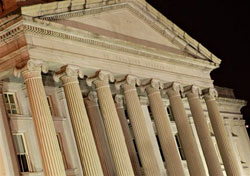| Home | Blog | Ask This | Showcase | Commentary | Comments | About Us | Contributors | Contact Us |

Six essential questions about the deficit, Wall Street and WashingtonASK THIS | August 224, 2010Fiscal expert Stan Collender points out that the bond market is not demanding deficit reduction -- in fact, quite the opposite. So where is the Washington establishment's obsession with the deficit coming from? Whose interests does it serve? By Stan Collender 1. For almost two decades we’ve been told that when you’re looking for signs of what Wall Street wants Washington to do about the federal budget, the bond market is the place to watch. What’s the bond market saying today? The bond market is being as unequivocal today as it was when Bob Rubin used what it was saying in 1993 to convince Bill Clinton that he had to push to reduce the deficit. The only difference is that, instead of demanding deficit reduction, the bond market today is exhibiting no worries about the deficit or federal borrowing at all In fact it’s indicating that Washington should do more to stimulate the economy.
Although there are also a number of technical reasons why the demand for federal debt is strong and interest rates have remained low, the bond market’s interest in Treasury securities has been high no matter what the maturity. This demonstrates that, contrary to what deficit hawks and demagogues have been insisting, there is little or no concern on Wall Street about the government’s borrowing, either short- or long-term.
2. Why are Congress and the White House ignoring the bond market now after feeling the need to follow it so closely before?
In 1993, the bond market was threatening higher interest rates if the deficit wasn’t reduced, something elected officials could ignore at their own political peril. By contrast, the only threat the bond market can make now is to lower interest rates further, and that isn’t as fearsome to politicians.
In addition, the bond market in 1993 had a former bond trader -- Bob Rubin -- as a high-level advisor to the president and, therefore, in a position to communicate and validate what it was saying to Washington.
Most important, however, what the bond market is saying today is different from what deficit hawks and GOP critics of the Obama White House want to hear. As a result, the echo chamber that amplified and repeated the bond market’s message almost two decades ago doesn’t exist today.
3. What makes 2010 so different from 1993 for the bond market when it comes to the deficit?
It’s simple: The economic situation today is the opposite of what existed at the start of the Clinton administration. In 1993, the bond market was worried about excess demand and soaring inflation, which would have eroded the value of bonds. Having the federal government spend less and tax more -- that is, do things that would reduce the deficit -- meant that the economy would cool rather than overheat, and therefore that the demand for goods, services, and workers would be reduced. This would keep inflation in check and allow federal bonds to maintain their value.
The big concern today is about deflation and slow growth rather than inflation and overheating. With unemployment high and capacity utilization low, the bond market not only isn’t worried about the excessive economic growth, it actually would welcome the additional activity that would be generated by higher spending and lower taxes.
4. So if Wall Street isn’t demanding that the deficit be reduced, who is?
In the current environment, the federal deficit is more of a political issue than an economic problem. It’s not surprising, therefore, that those demanding that the Obama White House and Democratic Congress reduce the deficit even in the face of the bond market’s insistence that it’s not needed are those who want to score political points by doing so. Look at the inflammatory language being used on this issue by the administration’s opponents and it’s easy to understand how much of what is being said is demagoguery rather than substantive policy analysis.
The White House has paid a great deal of lip service to the concept of deficit reduction and symbolically has done a number of things to demonstrate its concern. This has included a one-day deficit reduction “summit” at the White House and the creation of a presidentially-appointed deficit reduction commission.
But this too is far more about politics than about economics. Much of what the White House has done was intended to satisfy the demands of the so-called “Blue Dog” Democrats in the House who have made deficit reduction a major priority. The Blue Dogs are a significant coalition in the House and without their support much of the Obama agenda -- especially health care -- would never have been adopted. (There are even some reports that the White House agreed to support deficit reduction in return for votes for health care.)
Many of the Blue Dogs are from fiscally conservative districts and are facing serious reelection challenges from Republicans who have made the deficits that have occurred during the Obama administration into a significant issue.
In addition, although some deficit hawks have moderated their language to say that deficit reduction is needed over the long-term rather than immediately, they have continued to demand that a deficit reduction plan be proposed now. That's because deficit hawk groups are largely one-issue special interests, and pushing deficit reduction is what they do even when, as has been the case the past few years, a bigger rather than smaller deficit is economically justified.
5. Why do these groups and individuals insist that the deficit needs to be reduced? What’s in it for them?
More often than not, the federal budget deficit is a surrogate for something else rather than a standalone concern. Agitating about deficit reduction gives Republicans a reason to talk about their pet issue -- tax increases -- and to blame Democrats for them. Over the past two years the rising deficit has also been used by Republicans as a symbol of excessive government spending and involvement in people’s lives. Even though deficits have generally been higher when Republicans were in the White House and in control of Congress, complaining about the nominal record highs that have occurred the past two years under a Democratic administration, House, and Senate has given the GOP the opportunity to place the blame elsewhere.
6. How is it possible that the politics and economics of the deficit are so different?
The answer is: Ignorance. Polls, surveys, and other research demonstrate conclusively that the public exhibits little understanding about the federal budget, the budget deficit, and the impact of the deficit on the economy as a whole. This makes the situation ripe for the misleading statements, campaign slogans, and demagoguery that are typical of today’s U.S. budget politics. The average voter also has dramatically conflicting views about budget issues, which allows the public debate to disintegrate into emotional slugfests that have little to do with reality.
The current situation is a prime example. With unemployment high, economic growth slow, interest rates low, and the bond market and Federal Reserve all signaling that more needs to be done to change the outlook, deficit reduction would actually be harmful -- a repeat of Herbert Hoover-like policies that would prolong the slow recovery. Nevertheless, concern about the deficit has been growing over the past few years and in some polls rivals terrorism as an issue in people’s minds.
|
||||||||||||||||||||||




